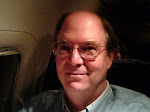When I was young, I saw the world
with one binary eye
in which all things were simplified
to right or wrong,
up or down,
aligned or unaligned,
ordered or di so rd er ed,
logical or emotional.
I'd roll a car window
either fully up
or fully down;
any position in-between
would make me feel uneasy
like a task left incomplete.
The same was true of lane changes.
I preferred to signal the change, and then
quickly jump to the new lane
rather than glide.
Likewise, success and failure
were absolutes, far apart.
Anything less than a total success
was a nagging failure
which demanded either a perfect fix
or a deep burial.
When my younger brother and I,
just children,
were given kits to be assembled,
just so, to make them work,
I finished mine and then I offered
to do my brother's too
not seeing that
the object of the kit was not
just to produce a working toy,
but to instruct and then reward
the student who succeeded.
Besides, I was certain that
I could do a better job;
I viewed him as unqualified
to do the task, and told myself
that it was right to save him from
the sadness that I knew he'd feel
when his attempt did not succeed.
He let me do the work
but my result did not conform
to my exacting code
that tolerated nothing less
than perfect operation.
I was crushed,
and felt enormous guilt
for having ruined his new gift
(although he really didn't care).
To fail was bad enough
but to destroy his property
was for me unpardonable,
a sign that I had overstepped
my bounds, and had,
in my enthusiasm,
damaged something valuable.
Those same feelings engulfed me
years later
when I tried to perfect the alignment
of my own toy telescope.
Instead I misaligned it;
it produced a double image
that I could not correct.
I put the toy away
and did not open it
until long years had passed;
until the pain had dulled.
Later I confessed these things
to a therapist who diagnosed my ills
and tried to help me change the way
I saw the world.
His medication helped me cope
but our discussions did not change
my attitudes about myself
and how I felt
about authority;
about responsibility.
It's not surprising that my views
determined my career. When shown
in school a demonstration of
a small machine that, on its own,
counted up in binary:
zero zero,
zero one,
one zero (it carried the one!)
one one.
I was enthralled.
Seemingly alive, it knew
how to count from one to ten
and signalled its accomplishments
with lights that accurately indicated
a zero or a one
with no grey areas in between.
If I could build machines like that
I saw that I could place my soul into
a world where everything proceeded
logically and without fault,
endlessly predictable. And if I
built it well enough
it would do its job forever
and would never fail.
But perfection was my bane
in many jobs
where getting products out the door
was more important than
making them so perfect that
they would never fail.
I worked long hours,
leaving my wife
and my child
home alone,
failing as a father while
practicing perfection that
no one really wanted.
And so my marriage failed,
breaking when in therapy
I told my wife
quite truthfully
I feared her accusations more
than I could return her love.
Today grey skies are overhead,
and grey hairs grow upon my face.
A grey fog clouds my brain
which still sees life as dangerous
and fears to take a single step
which might result in failure.
The failures of my past outweigh
the chances for a new success
that the present often brings.
"Not today", I say,
and close the door.
[2nd edition, 2018-11-19.]
[3rd edition, 2018-12-19.]
